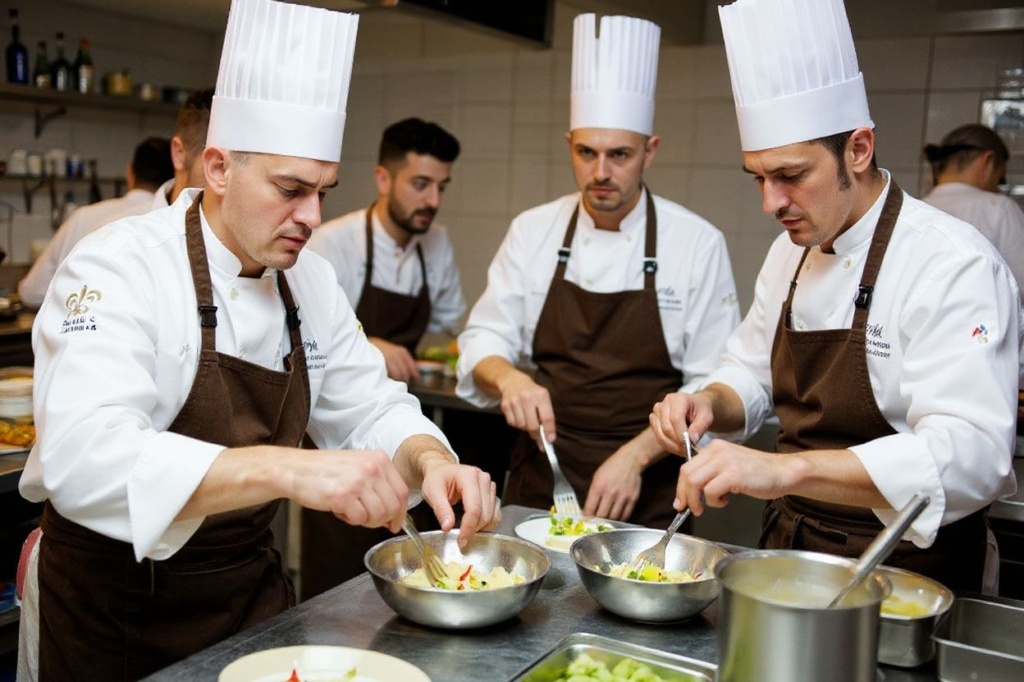
Anyone can cook, but not everyone is a chef. And what often separates one from the other is training.
The best culinary art schools have produced some of the world’s greats. There’s celebrity chef Martin Yan, the prolific Hong Kong-American with over 3,500 culinary and travel TV shows and 30 cookbooks; Marion Grasby, a favourite to win MasterChef Australia and now an entrepreneur with cookbooks, homewares and more under her name; David, who burst to the scene with Momofuku and has built a food empire since; and many more.
But the best chef in the world is a title held, for several years now, by the founder of the best restaurant in the world, Noma: René Redzepi. Not much is known about where he studied except that he called it a “restaurant school” that he attended for a year.
Like the reindeer brain jelly and beetle made from berry hides and black garlic his restaurant serves, his education — or lack of it — offers us some food for thought: is it actually necessary to go to a culinary art school to be successful?
 Despite never attending the best culinary art schools in the world, Gordon Ramsay’s establishments have been awarded 17 Michelin stars overall.
Despite never attending the best culinary art schools in the world, Gordon Ramsay’s establishments have been awarded 17 Michelin stars overall.
Do you need to go to the best culinary art schools?
Take celebrity chef Gordon Ramsay for example. The star of many reality TV cooking shows is the founder of a restaurant empire that has been awarded 17 Michelin stars overall. As of 2020, he’s valued at US$70 million.
Ramsay did not go to any of the best culinary art schools. Instead, he earned a degree in hotel management from North Oxon Technical College and then learned on the job in the kitchens at Harvey’s and La Gavroche in London.
Television personality and celebrity chef Martha Stewart didn’t attend any of the world’s best culinary schools either.
The 82-year-old business magnate studied history at Barnard College and worked as a stockbroker before launching her own catering company and at 41 years old, published her first book, “Entertaining.”
Having once said, “I’m not interested in cutting corners or taking shortcuts,” Stewart is known for creating recipes that do not take shortcuts, a testament to her paying close attention to detail in all aspects of her work.
With all their successes wrought from experience in place of education, does this mean going to any of the best culinary art schools in the world is unnecessary?
Based on Ramsay and Stewart’s, it appears that the answer is yes. You don’t need a fancy degree or certificate if you are dedicated, talented and have experience.
That said, no one can deny the power of a degree from one of the best culinary arts schools in the world in giving you a career boost, big or small.
It can be a jumpstart to becoming a head chef or the opportunity to work in some of the world’s most prestigious kitchens, such as Atomix in New York or Alchemist in Copenhagen.
In fact, a culinary arts degree offers structured learning, which provides a comprehensive education in cooking techniques, kitchen management, and food safety.
You will also learn about nutrition and dietetics, food science, and menu planning.
All of these are vital to helping you stand out as a promising chef when you step into the field.
Here are several other benefits of a culinary arts degree:
- Networking opportunities: You get to connect with instructors, classmates, and industry professionals who can help you in your career.
- Credibility: A degree can enhance your resume and make you stand out to potential employers.
- Internships and externships: Many programmes offer practical experience in real-world settings.
 Team of three Michelin-starred French chefs for “La Table du Castellet”, Fabien Ferre (unseen), cook in the kitchen of his restaurant in Le Castellet, southern France.
Team of three Michelin-starred French chefs for “La Table du Castellet”, Fabien Ferre (unseen), cook in the kitchen of his restaurant in Le Castellet, southern France.
The different types of culinary arts careers
Now that you’ve decided to pursue a culinary art degree, you’d also want to have an idea of which career you’d be interested to take on in the field.
Here are some prominent careers in the culinary arts:
- Executive Chef (Head Chef): Oversees the kitchen operations, designs menus, manages staff and ensures the quality of dishes.
- Sous Chef: Second-in-command in the kitchen, assists the head chef, supervises kitchen staff, and oversees the preparation and presentation of dishes.
- Pastry Chef (Pâtissier): Specialises in making pastries, desserts, breads, and other baked goods.
- Line Cook (Station Chef): Responsible for a specific section of the kitchen (eg grill, sautee, fry), prepares ingredients, cooks according to the menu
- Catering Chef: Plans and prepares meals for events and large gatherings, often managing a team of cooks and servers.
There are countless other careers to choose from. Whichever you prefer, the most important thing is pursuing the right culinary arts degree that will take you to greater heights, and of course, serve as a stepping stone to your culinary arts journey.
Here are some of the best culinary arts schools in the world:
Le Cordon Bleu, France
Le Cordon Bleu was founded in Paris in 1895 by the journalist and publisher of La Cuisinière Cordon Bleu magazine, Marthe Distel.
On 15 October 1895, the first cooking demonstration was held for the first time – today, it is one of the most prominent culinary art schools in the world, with students from all over the world enrolling in the school, including the notable Julia Child in 1950.
With a strong presence in some 20 countries with 35 international schools, entering a globally renowned culinary arts school without having to worry about being too far away from home is possible.
Whichever Le Cordon Bleu school you choose, it is possible to obtain Le Grand Diplôme Le Cordon Bleu in less than one year, granting you a reputable diploma that is recognised worldwide by culinary professionals.
However, in some countries, you’ll have to undergo different levels to receive the accredited diploma.
In Melbourne, Australia, for example, you’ll need to complete the Basic, Intermediate and Superior certificates (for both cuisine and pâtisserie) and a Work Integrated Learning (WIL) component, while in Kuala Lumpur, Malaysia, you’ll need to undertake both the Diploma in Cuisine and the Diploma in Pastry programmes.
Essentially, in the programme, you will first master basic culinary skills, which you will then apply to high-quality produce and speciality ingredients.
Under the guidance of some of the most qualified and classically trained chefs, you will learn essential culinary techniques through a blend of theoretical and practical training, including chef demonstrations and hands-on sessions.
On top of the prestigious Le Grand Diplôme Le Cordon Bleu programme, Le Cordon Bleu offers many other certificates, diplomas, bachelor’s, and master’s that combine innovation and creativity with tradition.

Auguste Escoffier School of Culinary Arts is one of the best culinary art schools in the world and the largest of its kind in the US. Source: Auguste Escoffier School of Culinary Arts Facebook
Auguste Escoffier School of Culinary Arts, USA
The Auguste Escoffier School of Culinary Arts is a renowned culinary institution named after the legendary French chef Auguste Escoffier, who is considered one of the founding figures of modern French cuisine.
The school is dedicated to continuing Escoffier’s legacy by providing comprehensive culinary education that combines classical techniques with modern innovations.
The school has campuses in Austin, Texas, and Boulder, Colorado, as well as an online platform that offers flexibility for students who need to balance their studies with other commitments.
Meanwhile, the curriculum at Escoffier is designed to cover a wide range of culinary skills and knowledge.
Escoffier’s Culinary School Online Programme, for example, covers culinary arts, whereby you’ll receive training in fundamental cooking techniques, knife skills, and ingredient handling; pastry arts, where you’ll focus on baking, pastry, and dessert preparation, from basic techniques to advanced creations; and farm to table experience, where emphasis is placed on sustainable and ethical food practices, including sourcing local ingredients and understanding food production.
You’ll also undertake a business management module, where you’ll learn about management, marketing, and entrepreneurship, all of which can prove vital if you hope to one day run your very own restaurant or bakery.
Tiffany Moore, a culinary arts graduate at Escoffier, can attest to this: “I decided to invest in myself and go to culinary school because I needed that backing. As for the management portion, that’s really where Escoffier is helping me learn how to run a restaurant and business.”
Escoffier also takes pride in its affordable tuition fees and financing options, highlighting that most Escoffier students use federal financial aid to help pay for culinary school.

The best culinary art schools in the world open the doors to opportunity for you, and that’s what you get at The Culinary Institute of America. Source: The Culinary Institute of America Facebook
Culinary Institute of America
The Culinary Institute of America (CIA) is one of the world’s premier culinary colleges, renowned for its comprehensive education, training in the culinary arts, and undying love for food.
Founded in 1946, the CIA has established a reputation for excellence and innovation in culinary education.
The CIA has multiple campuses located in Hyde Park, New York (main campus); St. Helena, California; San Antonia, Texas; and Singapore.
While the CIA offers a variety of programmes to choose from, one particular programme, the CIA Bachelor of Professional Studies in Culinary Arts or Baking and Pastry Arts completion programme, makes a great programme for those who have realised much later on that a career in the food world is what they really want.
In the school’s bachelor’s degree completion programs, you’ll get immersive, hands-on instruction from its industry-experienced faculty that will prepare you to confidently launch your career in the exciting world of food and hospitality.
The best part? You can customise your degree with a food- or beverage-focused concentration or approved culinary or baking and pastry electives.
You’ll also have the chance to specialise in an area of the food world that interests you most, with immersive study concentrations available in locations such as California, Japan, Singapore, Spain, or Texas.

Those with a passion for food and who want a career for life will find their calling at Culinary Arts Academy Switzerland. Source: Culinary Arts Academy Switzerland Facebook
Culinary Arts Academy Switzerland
The Culinary Arts Academy Switzerland (CAAS) is a prestigious institution renowned for its high-quality culinary education, combining Swiss hospitality traditions with modern culinary techniques.
You don’t just get a world-class education – you also get the qualifications to back it up.
Located in the heart of Switzerland with two different campuses, CAAS provides you with a comprehensive education in the culinary arts, equipping you with the skills and knowledge needed to excel in the global culinary industry.
The school’s Bachelor of Arts in Culinary Arts is one of a kind – transferring the practical skills you need to be a top chef, while also educating you to be an entrepreneur.
You have the option to choose between pathways in Culinary Arts, Pastry & Chocolate Arts, and Vegetarian Culinary Arts (talk about inclusivity!).
Whichever pathway you choose, you’ll learn from some of the most experienced chefs and industry professionals who have worked in kitchens, five-star hotels, and Michelin-starred restaurants all over the world providing their personalised mentorship and sharing their extensive knowledge and expertise.
But that’s not all – the school also provides regular visits from guest lecturers comprising world-class chefs and industry leaders, such as Felchlin Switzerland, one of the leading companies with the finest Swiss chocolate and semi-finished products, which gave a masterclass on chocolate.










